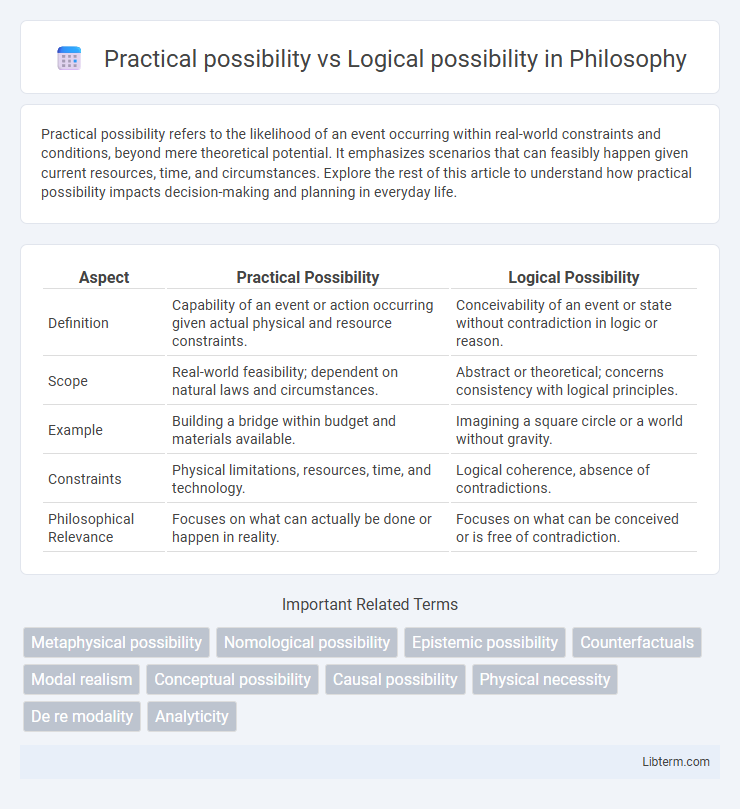Practical possibility refers to the likelihood of an event occurring within real-world constraints and conditions, beyond mere theoretical potential. It emphasizes scenarios that can feasibly happen given current resources, time, and circumstances. Explore the rest of this article to understand how practical possibility impacts decision-making and planning in everyday life.
Table of Comparison
| Aspect | Practical Possibility | Logical Possibility |
|---|---|---|
| Definition | Capability of an event or action occurring given actual physical and resource constraints. | Conceivability of an event or state without contradiction in logic or reason. |
| Scope | Real-world feasibility; dependent on natural laws and circumstances. | Abstract or theoretical; concerns consistency with logical principles. |
| Example | Building a bridge within budget and materials available. | Imagining a square circle or a world without gravity. |
| Constraints | Physical limitations, resources, time, and technology. | Logical coherence, absence of contradictions. |
| Philosophical Relevance | Focuses on what can actually be done or happen in reality. | Focuses on what can be conceived or is free of contradiction. |
Introduction to Practical and Logical Possibility
Practical possibility refers to what can be achieved or executed within real-world constraints, including physical, technological, and temporal limitations. Logical possibility involves scenarios or propositions that do not contain contradictions and are conceivable within the bounds of logical coherence, regardless of real-world feasibility. Understanding the distinction between practical and logical possibility is essential in fields such as philosophy, artificial intelligence, and decision theory to evaluate what actions or ideas are viable versus theoretically conceivable.
Defining Logical Possibility
Logical possibility refers to the coherence of a proposition within the framework of formal logic, meaning it cannot contain any contradictions or violate logical principles. This concept is crucial in distinguishing scenarios that are conceivable in theory from those that are inherently absurd or self-refuting. Logical possibility serves as a foundational criterion in philosophical debates and modal logic, separate from practical feasibility or empirical constraints.
Understanding Practical Possibility
Practical possibility refers to scenarios or actions that can be feasibly executed within real-world constraints such as physical laws, resources, and technology, unlike logical possibility, which only requires that a scenario be free from internal contradictions. Understanding practical possibility involves evaluating factors like time, cost, and available tools, making it critical in decision-making, risk assessment, and project management. This distinction ensures that plans or ideas are grounded in achievable reality rather than abstract logical consistency.
Key Differences Between Practical and Logical Possibility
Practical possibility refers to what can feasibly occur given current physical, technological, or circumstantial constraints, while logical possibility pertains to what can exist without contradiction in any logically coherent scenario. Key differences include practicality's dependence on real-world limitations versus the purely theoretical nature of logical possibility, which ignores physical laws and focuses solely on conceptual consistency. Logical possibility encompasses all scenarios not leading to paradoxes, whereas practical possibility is restricted by evidence, resources, and environmental factors.
Real-world Examples of Logical Possibility
Logical possibility refers to scenarios that do not entail any contradictions and can exist in theory, even if they are not achievable in practice. For example, the concept of a square circle is logically impossible, while time travel remains logically possible because it does not violate any fundamental logical laws, though it is not practically feasible with current technology. Parallel universes and alternative histories also represent logically possible scenarios explored in physics and philosophy, despite lacking empirical realization in the real world.
Real-world Scenarios of Practical Possibility
Practical possibility refers to what can feasibly occur given physical, technological, and resource limitations in real-world scenarios, such as constructing a high-speed rail system within budget and environmental constraints. Logical possibility, by contrast, encompasses any scenario that does not involve contradictions, regardless of real-world feasibility, like time travel or perpetual motion machines. Understanding practical possibility is crucial for decision-making in engineering, economics, and policy, where theoretical ideas must be tested against tangible conditions and available means.
Situations Where Practicality Limits Logic
Practical possibility refers to what can be achieved given real-world constraints such as time, resources, and physical laws, while logical possibility only requires consistency within a set of rules or propositions without contradicting logic itself. Situations where practicality limits logic often arise in engineering and technology, where a concept may be logically sound but physically unfeasible due to cost, materials, or energy requirements. For example, creating a perpetual motion machine is logically possible to conceive but practically impossible because it violates the laws of thermodynamics.
Philosophical Significance of Possibility Distinctions
Philosophical significance of distinguishing practical possibility from logical possibility lies in understanding the constraints on human action versus the boundaries of conceivable reality. Logical possibility refers to scenarios consistent with the laws of logic, allowing for comprehensive exploration of hypothetical worlds, whereas practical possibility pertains to what agents can feasibly achieve given physical, temporal, or cognitive limitations. This differentiation underpins debates in metaphysics, epistemology, and ethics by clarifying what alternatives are genuinely open to agents versus those merely imaginable but unrealizable.
Implications in Decision-Making and Problem-Solving
Practical possibility refers to options achievable within real-world constraints such as time, resources, and technology, whereas logical possibility pertains to scenarios that are conceivably true without contradiction, regardless of feasibility. In decision-making and problem-solving, recognizing the distinction ensures choices are grounded in actionable plans rather than merely theoretical alternatives, optimizing resource allocation and risk assessment. Ignoring practical limitations while focusing solely on logical possibilities can lead to ineffective strategies and wasted efforts.
Conclusion: Relevance in Everyday Reasoning
Practical possibility pertains to what can be achieved given real-world constraints like technology, resources, and time, whereas logical possibility involves what is conceivable without contradiction, independent of physical limitations. Everyday reasoning hinges more on practical possibility since decisions and actions depend on feasible outcomes rather than mere logical consistency. Understanding this distinction enhances critical thinking by aligning expectations with actual capabilities in decision-making contexts.
Practical possibility Infographic

 libterm.com
libterm.com